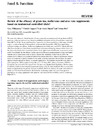Identificador persistente para citar o vincular este elemento:
https://accedacris.ulpgc.es/jspui/handle/10553/16730
| Título: | Review of the efficacy of green tea, isoflavones and aloe vera supplements based on randomised controlled trials | Autores/as: | Williamson, Gary Coppens, Patrick Serra-Majem, Lluis Dew, Tristan |
Clasificación UNESCO: | 3206 Ciencias de la nutrición | Palabras clave: | Bone-Mineral Density Antidiabetic Activity Diabetes-Mellitus Soy Isoflavones Blood-Pressure, et al. |
Fecha de publicación: | 2011 | Publicación seriada: | Food and Function | Resumen: | We assess the evidence for health benefits of three commonly consumed plant food supplements (PFS), green tea, isoflavone and aloe vera, based on published systematic reviews of randomised controlled trials (RCTs). Whilst the potential benefits of green tea have been reported in a wide range of health areas, it is only in the area of the metabolic syndrome that the number of RCTs is approaching sufficient to judge such efficacy. Isoflavone supplements are widely used, and RCTs indicate that they affect bone resorption at lower doses in postmenopausal women undergoing estrogen-related bone loss, but this is only translated to attenuation of bone loss at higher doses of isoflavones. A systematic review on RCTs concluded that the effects of isoflavones on hot flashes in postmenopausal women were highly variable and no conclusions could be drawn. Despite the popularity of aloe vera as a PFS, the evaluation of its efficacy as a coadjuvant therapy for certain metabolic or digestive pathologies remains scarce; it constitutes a typical example of a naturally occurring ingredient whose efficacy in topical applications presupposes its efficacy in systemic applications. Nevertheless, its possible toxic effects on oral consumption call for caution in its utility as a PFS. Since 2007, efficacy evaluation of PFS in Europe has been covered by European Union Nutrition and Health Claims legislation. The European Food Safety Authority has adopted an approach relying on RCTs, while medicinal effects are accepted based on traditional use. In general, there are insufficient RCTs for claims to be made, and conclusive results on PFS should be obtained in the future by conducting studies with more homogeneous populations, by using supplements with optimised and measured bioavailability, and by conducting larger RCTs. | URI: | https://accedacris.ulpgc.es/handle/10553/16730 | ISSN: | 2042-6496 | DOI: | 10.1039/c1fo10101c | Fuente: | Food & Function [ISSN 2042-6496], v. 2 (12), p. 753-9 | Derechos: | by-nc-nd |
| Colección: | Reseña |
Citas SCOPUSTM
17
actualizado el 08-jun-2025
Citas de WEB OF SCIENCETM
Citations
15
actualizado el 08-feb-2026
Visitas
60
actualizado el 10-ene-2026
Descargas
263
actualizado el 10-ene-2026
Google ScholarTM
Verifica
Altmetric
Comparte
Exporta metadatos
Los elementos en ULPGC accedaCRIS están protegidos por derechos de autor con todos los derechos reservados, a menos que se indique lo contrario.
